Crafting Character Arcs in Dark Fantasy
By Isolde Thorne / Oct 26
In the dim light of a flickering candle, the shadows of our choices dance upon the walls, whispering tales of power and corruption. Have you paused to consider the weight of a single decision in a world where every choice can tip the scales of fate? This is the heart of dark fantasy—where the line between hero and villain blurs, revealing profound moral complexities.
Delve into the defining characteristics of dark fantasy and meet some of the genre's most impactful authors.
Roots in ancient myths & folklore
Embraced new themes & societal anxieties
Modern popularity with reimagined tropes
Diverse styles (grimdark to whimsical)
Dark fantasy is a genre that invites us into worlds where shadows reign and the line between good and evil is tantalizingly blurred. It encompasses a rich tapestry of themes and elements that resonate with readers, offering a subversive take on traditional fantasy narratives. Here, moral complexity thrives, and the characters often grapple with their inner demons, creating stories that are not only thrilling but deeply reflective of the human experience.
What defines this gripping genre? At its core, dark fantasy merges elements of horror, mythology, and the supernatural. It's a space where mythical creatures and corrupted heroes coexist, crafting narratives that challenge our perceptions of morality. Themes of power, corruption, and redemption frequently emerge, inviting readers to ponder the darker aspects of humanity.
To understand dark fantasy fully, it's essential to recognize its core themes and elements that set it apart. Here are some defining characteristics:
Each of these elements contributes to the allure of dark fantasy, drawing readers into immersive worlds that explore the depths of the human condition.
Dark fantasy has evolved significantly over the years, transitioning from ancient myths and folklore to contemporary literature that captivates modern audiences. Its roots can be traced back to early tales filled with supernatural beings and moral lessons. As storytelling progressed, so did the genre, embracing new themes that reflect societal anxieties and changes.
In recent decades, dark fantasy has surged in popularity, thanks in part to authors who have reimagined classic tropes. The genre now encompasses a wide range of styles, from grimdark narratives that revel in realism and brutality to more whimsical takes that still maintain a sense of darkness. This evolution allows a diverse array of voices and ideas to flourish, creating a rich landscape for both readers and writers.
As you immerse yourself in the world of dark fantasy, we're curious to know: What themes resonate most with you? Do you find yourself drawn to tales of moral ambiguity, or do you prefer the allure of supernatural elements?
In the realm of dark fantasy, we are graced by a myriad of authors who have pushed the boundaries of storytelling. These creative minds have intertwined darkness with magic, crafting narratives that not only captivate but also challenge our understanding of reality. Each author brings a unique perspective to the genre, enriching our journey through shadowy realms. Let’s shine a light on some of these influential figures and explore their contributions to the art of dark fantasy.
Tim Lebbon is known for his masterful ability to merge elements of horror with fantasy, creating unsettling yet fascinating tales. His works often explore the fragility of humanity against an encroaching darkness, leaving readers questioning their own resilience.
Lebbon’s narratives prompt us to confront our deepest fears, proving that darkness is not just a backdrop, but a character in its own right. His writing resonates with those of us at Shadows of Imagination, as we delve into the emotional complexities within dark tales.
Another luminary in the dark fantasy scene is Maggie Stiefvater. Her prose is rich and lyrical, often featuring characters with profound inner struggles. Stiefvater's stories resonate on multiple levels, inviting readers into a world where magic intertwines with the mundane.
Her unique narrative style encourages us to explore the nuances of our own lives, while her characters face challenges that mirror our own journeys.
No exploration of dark fantasy would be complete without mentioning Stephen King. Though primarily known for his horror, many of his works blur the lines between genres, revealing the dark undercurrents of human nature.
King’s ability to tap into the collective fears of society shines through in his stories, resonating deeply with readers who find solace in his exploration of darkness.
H.P. Lovecraft's work transcends traditional dark fantasy, venturing into the realm of cosmic horror. His stories present a universe filled with ancient, unfathomable beings that challenge our understanding of existence.
Lovecraft’s influence has permeated the genre, inspiring countless authors to weave themes of the unknown into their narratives. He reminds us that the real terror often lies in the vastness beyond our comprehension.
Clive Barker is a formidable force in dark fantasy, known for his vivid imagination and capacity to blend horror with fantastical elements. His works often challenge the boundaries of reality, inviting readers into worlds where beauty and horror coexist.
Barker’s narratives resonate with those of us who appreciate not just the fear, but the beauty found within the shadows. His works remind us of the transformative power of storytelling.
Anne Rice’s contributions to dark fantasy are undeniably profound. Her exploration of vampire lore through a gothic lens has captivated readers for decades, establishing a foundation for modern dark fantasy.
Rice’s characters grapple with their identities in a world filled with moral ambiguity, prompting readers to reflect on their own choices—an essence that drives the community at Shadows of Imagination.
Neil Gaiman is a master of weaving traditional mythology into contemporary dark fantasy. His tales often blend the familiar with the fantastical, creating a world where myths come alive in unexpected ways.
Gaiman’s work encourages us to reconsider the stories we tell and the myths we live by, making him a beloved figure in both the literature and fan communities.
As we reflect on these influential authors, it’s evident that their unique voices and perspectives enrich the tapestry of dark fantasy. At Shadows of Imagination, we celebrate their contributions and invite you to explore the depths of their narratives. Which tales resonate with you, and how do they inspire your own creative journeys?
Moral ambiguity refers to situations where characters, actions, or decisions cannot be neatly categorized as purely good or evil. In dark fantasy, protagonists often face ethical dilemmas that challenge traditional morality, blurring the lines between hero and villain.
Supernatural elements, such as magic, myths, and creatures of the night, are integral to dark fantasy. They shape the narrative, drive conflict, and immerse readers in worlds where the unexplained and terrifying play significant roles.
Dark fantasy settings are typically atmospheric, bleak, and foreboding. These environments enhance the mood of danger, suspense, and despair, reflecting the genre's exploration of darker themes and the human condition.
Influential authors include Stephen King, known for blending horror and fantasy; H.P. Lovecraft, master of cosmic horror; Clive Barker, who mixes horror with fantastical elements; Anne Rice, a pioneer of gothic dark fantasy; and Neil Gaiman, who weaves mythology into contemporary dark fantasy.
Core themes frequently explored in dark fantasy include power and corruption, redemption and sacrifice, identity and immortality, and existential dread. These themes prompt readers to reflect on the darker aspects of humanity and society.
Here is a quick recap of the important points discussed in the article:
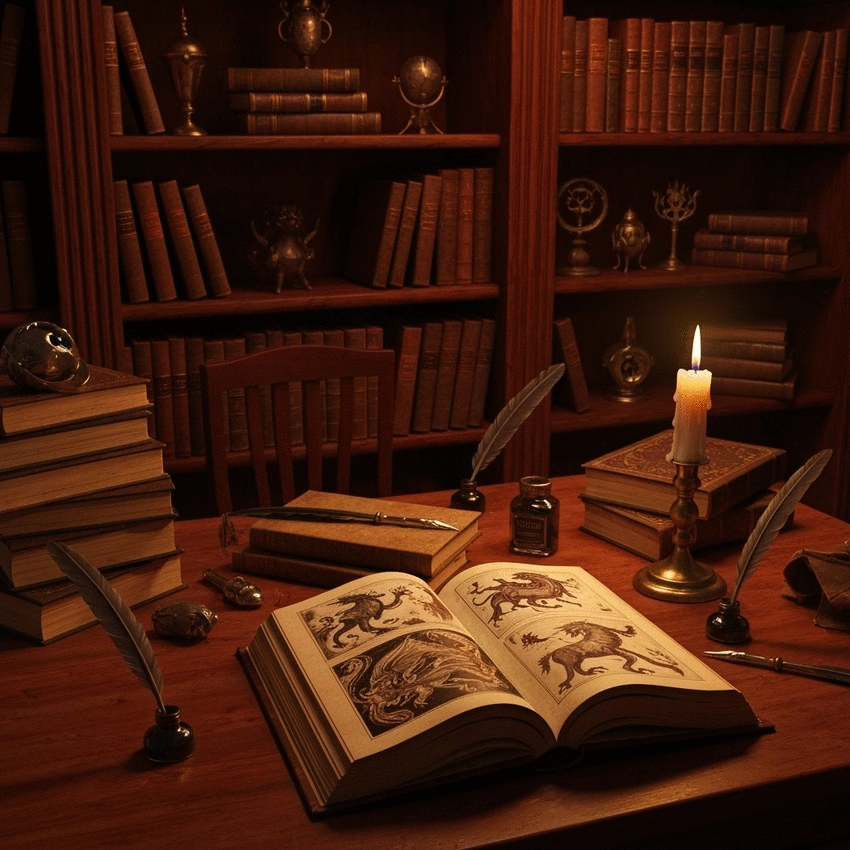
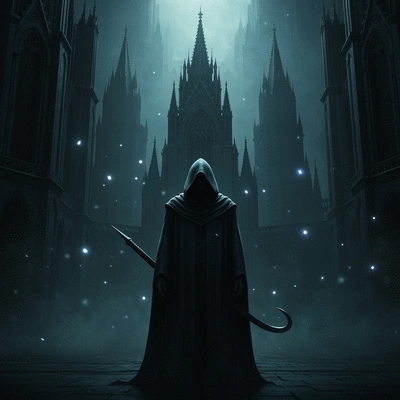
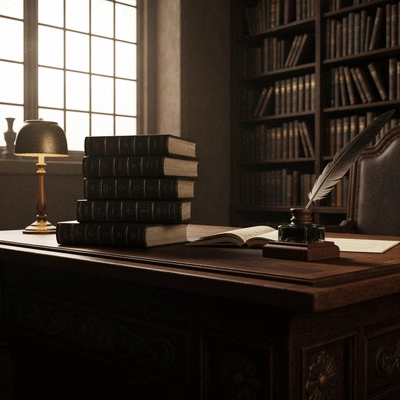
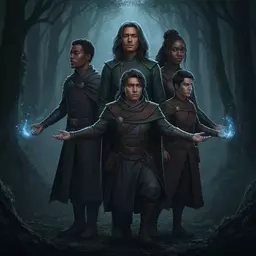 Crafting Character Arcs in Dark Fantasy
In the dim light of a flickering candle, the shadows of our choices dance upon the walls, whispering
Crafting Character Arcs in Dark Fantasy
In the dim light of a flickering candle, the shadows of our choices dance upon the walls, whispering
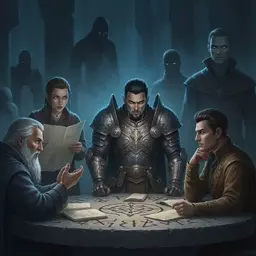 Crafting Morally Complex Dark Fantasies
In the dim light of a flickering candle, the shadows of our choices dance upon the walls, whispering
Crafting Morally Complex Dark Fantasies
In the dim light of a flickering candle, the shadows of our choices dance upon the walls, whispering
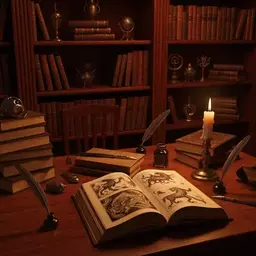 Exploring Dark Fantasy Narratives
In the dim light of a flickering candle, the shadows of our choices dance upon the walls, whispering
Exploring Dark Fantasy Narratives
In the dim light of a flickering candle, the shadows of our choices dance upon the walls, whispering